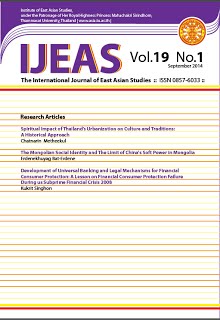The Mongolian Social Identity and The Limit of China’s Soft Power in Mongolia
บทคัดย่อ
Discussions about China has expanded in last few decades in line with its rise in power and influence, and now include a range of topics such as its implication for the world, its soft power and so on. Many note that embrace and application of soft power by China are concerned with its long and short term objectives in relations with other countries including Mongolia. However, with several observations exposing persistent anti-Chinese attitudes among the Mongolian public, effectiveness of China’s soft power has been questioned. The study aims to clarify the limit of China’s soft power in Mongolia and to fi nd out factors causing the limit by assuming that the concepts of power, soft power, and a theoretical approach that explain interactions between social groups would help determine outcome of soft power. It fi nds that in order for China to get outcomes it wants relations with Mongolia, China’s soft power has to consider the unique characteristic of relations, that is, context of soft power. it also argues that although China is aware of this fact, Mongolian social identity confl icts with the soft power policy promoted by public diplomacy, namely, cultural activities of China. The paper argues that success of soft power in making favorable behaviors such as attraction, persuasion, and agenda setting as suggested by Joseph Nye in a target country is contingent upon not only power resources, but also upon contextual factors such as social identities of those countries involved.



